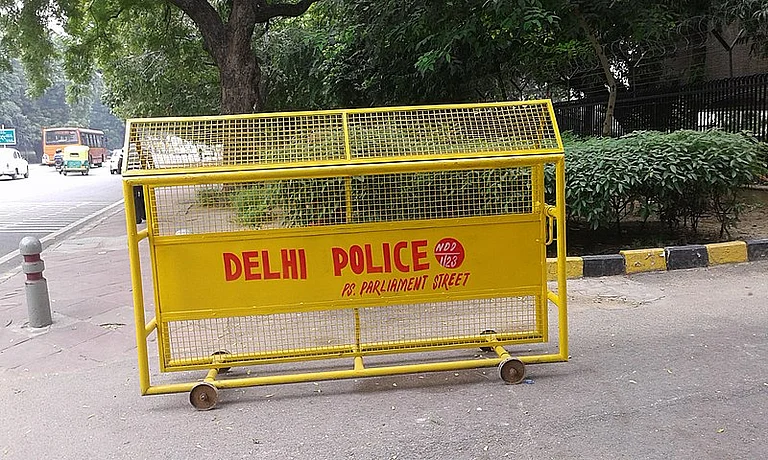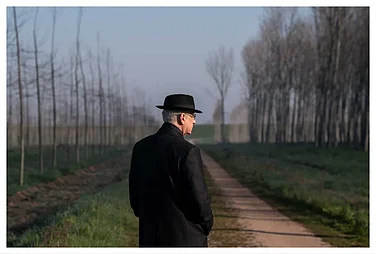Many years ago, while talking about the irrelevance of religious differences in music, Pandit Ravi Shankar had said: “It would be nice to believe that our music can help people to imagine life without the fundamentalism we see today—not only between Hindus and Muslims in India and Pakistan but between other religions and peoples in other parts of the world. But we can never really know if this will happen. All we can do is play our music and share it with the rest of the world.” With his passing, a master musician has died who did much to carry music’s universal message of peace to the world at large for over half a century.
Trained initially as a dancer and actor, Ravi Shankar went to a French Catholic School in Paris and started playing the esraj. He listened to many western classical masters while touring and performing as a member of the troupe his elder brother Uday Shankar had put together. Later, he became a shishya of the legendary guru, Ustad Allauddin Khan of Maihar. The latter was a hard taskmaster and the training, long and torturous, made him aware of the depth, range and rigour of tradition and instilled in him an ambition for individuality and freedom.

Ravi Shankar with daughters Anoushka, left, and Norah Jones
As a performer, he incorporated on the sitar the long meditative alaap of the Dhrupad Ang, probably the first one to do so. It became so widely accepted that it has now become a norm, an inevitable part of tradition itself. In his hands, tradition, while sustaining its classicism, authenticity and purity, opened itself to change. It acquired a dynamism by absorbing and responding to change. He believed that purity cannot possibly be soiled or diluted by change. It may even be claimed that because of him the sitar attained not only great prestige but also immense popularity as an instrument of both continuity and change. He effortlessly created on it a range of emotions: from silence to fury, passion to tranquility, sensuous intimations to spiritual resonances. He always emphasised that his music aimed at being, in the end, spiritual. His music led us to depths of silence and meditative tranquility, a stillness at once ennobling and energising. He was a true classicist who led through pleasure to peace. Here was music in which the sitar spoke and sang, thought and meditated, played and danced.
Ravi Shankar was also a pioneer through whom the Indian classical music scene became audibly and tangibly a part of world music, not to speak of the global popularity the sitar achieved as a musical instrument. He collaborated with some of the outstanding western classical musicians of our time, Yehudi Menuhin, Philip Glass, Zubin Mehta as also with pop and jazz musicians. Menuhin famously said: “He has not only brought Indian classical music to the West, but he has also, in no small degree, influenced Western music itself.”

Play it again... The sitar maestro with students at ‘The Ravi Shankar Centre’ in Chanakyapuri, Delhi. (Photograph by Bishwadeep Moitra)
Ravi Shankar also composed in many genres, including orchestra, ballet and film music. For many years, he was chief of the air national orchestra and wrote music for many films including the Apu trilogy (Satyajit Ray) and Gandhi (Richard Attenborough). He was almost the first classicalist to interact with popular and contemporary culture on his own terms. And he was as much awarded as loved. The Bharat Ratna (1999), three Grammy awards, the Fukuoka Asia Culture Prize (1991), the Magsaysay award (1992), they all came calling.
Ravi Shankar was also deeply interested in the well-being of the creative community and made personal efforts in furthering the careers of many young musicians. In him, one could confidently claim, Indian musical culture reached a civilised and civilising peak. He was someone who through his dynamic vision, technical mastery and innovative zeal made the purely classical utterly modern: the dichotomy of the classical and the modern stood dismantled, almost demolished.
If we concede that makers of modern India are not only politicians and intellectuals but also writers, artistes etc, then Ravi Shankar will be one of those who stood tallest, embodying India’s cardinal values and vision in his creations. A man whose unique music will be remembered and admired for centuries to come for its purity, passion and pursuit of peace.
It was in July 1938 that I ultimately went to Baba (Ustad Allauddin Khan) in Maihar, after two years of intensive introspection. I was like John Bunyan’s Mr Facing-both-ways. I could not choose between the glitter, glamour and fun of touring all around the world with my brother (Uday Shankar), and going to the remote village of Maihar. It was a tough decision but finally I overcame all the predicaments within myself and decided to go to Baba and lead the kind of life that would please him. I was also aware of the consequences of his wrath in case I was whimsical. I went to Maihar dressed in a simple outfit, shaven head and found it to be a great transformation. Maihar was a small village surrounded by forests and hills that appeared to come alive with the sound of music.
I was allotted a small house adjacent to where Baba lived. It was infested with rats and snakes. It was scary even during the day, not to speak of the eerie experiences with mosquitoes, cockroaches, flies, lizards, creaking doors and windows. At night, the hooting of the owl followed by the howling of winds transformed the landscape into a weird experience. I think it was my sheer willpower that held me back there. But for this gritty determination, I would have collapsed. It was sheer commitment to a dream. It took me almost six months to adjust to this setting which was so alien to the life I had led so far. I began practising for hours together and also taking lessons on sitar and surbahar regularly from Baba. This spanned the first three years of the seven years in Maihar with my Guru.
***
Baba was a deeply religious person, and was above any discrimination on grounds of caste or creed. Initially, he was not allowed entry to Maa Sharada’s temple in Maihar. But observing his religious fervour, Baba’s ardent disciple Brijnarain Singhji requested the priests to give Baba permission to pray, since he was a true Shakta.
Being born in a village mainly inhabited by Hindus and his elder brother being a “Kali Siddha”, Baba had a deep respect, understanding and knowledge of Hinduism and all the different schools of thought and its doctrines. He was also a devout Muslim performing namaaz five times a day and became a “Haji” having visited Mecca, Medina and Baytul Muqaddas in his pilgrimages.
Excerpted from Pandit Ravi Shankar’s introduction to Anuradha Ghosh’s Ustad Allauddin Khan: The Legend of Music, publications division, I&B ministry
(Ashok Vajpeyi is a Hindi poet and arts aficionado)

























